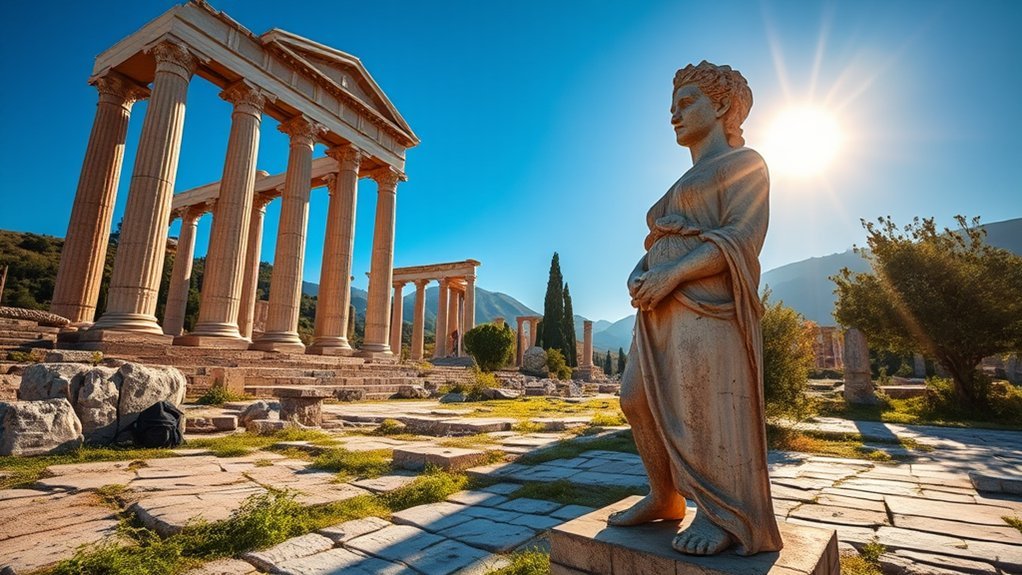13 Spiritual Meanings of Ephesus
As we explore the spiritual meanings of Ephesus, we uncover a rich tapestry of history and significance that resonates with seekers today. From the ancient wisdom embodied in its ruins to the introspective nature of the Temple of Artemis, this city invites us to reflect on our own journeys. We might consider how early Christianity influenced the area or how the mystical practices that emerged there continue to inspire. Each facet offers unique insights, but what truly lies beneath the surface of Ephesus' spiritual legacy? Let's uncover these layers together.
A Quick Overview
- Ephesus symbolizes spiritual awakening, with its ancient ruins representing the pursuit of deeper truths beyond mere knowledge.
- Pilgrimage sites in Ephesus invite introspection and transformative experiences, shaping personal faith and connection to the divine.
- The city's history embodies themes of transformation and renewal, emphasizing cycles of endings and new beginnings in spiritual journeys.
- Early Christianity in Ephesus fostered resilience and unity, facilitating personal spiritual journeys amidst diverse faiths and cultural exchanges.
- Mystical practices and seasonal celebrations in Ephesus invoked gratitude and spiritual essence, promoting community and shared purpose among participants.
Ancient City of Wisdom
Ephesus, a cradle of ancient wisdom, beckons us to explore its rich history and profound spiritual significance. As we stroll through its timeworn streets, we can almost hear the whispers of philosophers and seekers who once walked here, searching for deeper truths. The ruins around us serve as a reminder that wisdom isn't merely a collection of knowledge; it's the spiritual enlightenment that comes from understanding our place in the universe.
Together, we can reflect on how Ephesus was more than just a bustling city; it was a sanctuary for those yearning for connection and meaning. The echoes of its past invite us to probe into our own inner journeys, challenging us to ask: What can we learn from those who sought enlightenment in this sacred space?
As we stand before the remnants of ancient structures, we feel a sense of belonging, realizing that the pursuit of wisdom transcends time.
Let's embrace the lessons of Ephesus, allowing its ancient wisdom to guide us toward our own spiritual awakening, reminding us that we're all part of this beautiful, intricate tapestry of existence.
Temple of Artemis Significance
The Temple of Artemis stands as a monumental tribute to the profound spiritual and cultural significance of this ancient city. As we explore its magnificence, we can't help but reflect on the deep roots of Artemis worship that connected the people of Ephesus with something greater than themselves.
This temple wasn't just a place of worship; it was a sanctuary for hopes, dreams, and the very essence of community.
The intricate temple architecture speaks volumes about the dedication and artistry of its builders. Each column, each stone laid, tells a story of devotion, illuminating the values and beliefs that shaped their world.
In its grandeur, we see a mirror reflecting our own yearnings for connection, transcendence, and belonging. The Temple of Artemis was a gathering place where individuals united in reverence, seeking solace and strength in their shared faith.
As we think about its significance today, we realize that the spirit of Artemis still lingers in our hearts, inviting us to honor our own paths and the communities we build.
In this way, we find that the legacy of the Temple of Artemis continues to inspire our collective journey toward spiritual fulfillment.
Symbol of Resurrection
As we reflect on the spiritual heritage of Ephesus, we encounter the profound symbolism of resurrection that permeates its history. This ancient city, with its rich tapestry of beliefs and traditions, invites us to explore our own paths of spiritual rebirth. The notion of resurrection symbolism resonates deeply within us, reminding us that life is an ongoing cycle of endings and new beginnings.
In Ephesus, we find echoes of transformation in its timeless ruins, where the past intertwines with the present. These remnants speak to our collective experience of loss and renewal. Just as the city has risen from the ashes of its former self, we too can embrace our own metamorphosis. Each step we take toward understanding our spiritual selves can lead us to profound revelations.
As we ponder the significance of resurrection in our lives, we recognize that it's more than just a historical concept. It's a call to awaken our inner selves, to shed old layers that no longer serve us, and to embrace the promise of new life.
Together, we can find solace in the shared journey of rebirth, fostering a deeper connection to ourselves and to each other.
- Natural soy 6 oz candle for cleansing negative energy
- Includes Sage, Rose, Lavender and Essential Oils in Every Candle
- A Luxury Candle for Your Soul: Immerse yourself in a refreshing blend of crisp ocean mist and subtle...
- Non-Toxic, Clean, Highly Scented: With 2 large crystals, several hydrangeas and 2 lead-free cotton...
- Natural soy 6 oz candle for Negative Energy & People
- Includes Sage, Himalayan Crystal Salt and Essential Oils in Every Candle
- 7 Chakra Crystal Candles Set: Each candle includes chakra tumble stones giving you the most healing...
- Variety of Unique Aromas: Choose from 7 different aromatherapy scents and a wonderful selection that...
- Dragon’s Blood Infusion: Infused with Dragon’s Blood resin, this pure sea salt helps amplify...
- Versatile for Candle Magic & Spells: Boost the potency of your manifestation spells, candle rituals,...
Sacred Sites of Pilgrimage
Sacred sites of pilgrimage beckon us to commence on journeys of the soul, inviting introspection and connection to something greater than ourselves. As we traverse these ancient paths, we find ourselves immersed in the rich tapestry of history and spirituality that resonates deeply within us.
Each pilgrimage site serves not only as a destination but as a transformative experience—a sacred journey that shapes our understanding of faith and belonging.
In Ephesus, we can feel the echoes of countless souls who've walked before us, seeking solace and clarity. The ruins whisper stories of devotion, reminding us that we're part of a larger narrative.
Together, we can explore the remnants of temples and sanctuaries, allowing ourselves to be enveloped by the energy that still lingers in these spaces.
As we gather at these pilgrimage sites, we foster a sense of community and shared purpose, affirming our desire for connection.
These sacred journeys empower us to reflect on our beliefs, igniting a longing for deeper understanding. In this collective exploration, we discover not just the past but also a renewed sense of ourselves, drawing us closer to the divine.
Influence of Early Christianity
Ephesus stands as a tribute to the profound influence of early Christianity, a place where faith transformed not only the landscape but the hearts of countless believers. As we walk through its ancient streets, we can almost feel the echoes of the early doctrines that shaped its community. Here, the apostolic influence was palpable, as the teachings of apostles like Paul took root, instilling a sense of purpose and belonging in the hearts of those who gathered.
Reflecting on this legacy, we realize that Ephesus wasn't just a city; it was a vibrant hub where faith flourished amidst diversity. The early Christians faced challenges and opposition, yet their resilience forged a path for future generations. This spirit of unity and devotion inspires us today, reminding us that we, too, can find strength in our beliefs and community.
Ephesus's walls whisper stories of transformation, urging us to embrace our spiritual journeys. By revisiting these early teachings, we can cultivate a deeper connection to our faith and to one another.
Together, let's honor this rich heritage and continue fostering a sense of belonging that transcends time and place.
Philosophical Teachings in Ephesus
In the heart of Ephesus, we uncover a tapestry of philosophical teachings that challenge and inspire our understanding of existence.
The rich legacy of this ancient city holds transformative insights from various philosophical schools, inviting us to seek spiritual enlightenment together.
As we navigate these teachings, we find three core ideas that resonate deeply within us:
- Unity of Existence: The belief that all beings are interconnected encourages us to foster compassion and empathy in our lives.
- The Pursuit of Knowledge: Ephesus teaches us that the quest for wisdom is essential for our personal growth. It's in asking questions and seeking answers that we evolve.
- Inner Peace: Many philosophical schools emphasize the importance of cultivating tranquility within ourselves, reminding us that true fulfillment comes from within.
These teachings not only illuminate our paths but also create a sense of belonging in a world that often feels fragmented.
Connection to the Divine
Exploring the philosophical teachings of Ephesus naturally leads us to contemplate our connection to the Divine. As we investigate the ancient wisdom that echoes through the ruins, we begin to sense a deeper, almost tangible bond that transcends time and space. This divine connection invites us to reflect on our own spiritual awakening, encouraging us to seek a greater understanding of ourselves and the universe.
In Ephesus, we find reminders that spirituality isn't a solitary journey; it's a shared experience, fostering a sense of belonging among those who seek the divine. Each stone, each inscription tells stories of seekers who, like us, yearned for connection and enlightenment. This sacred space can inspire us to pause and listen to the whispers of our hearts.
As we unite in this exploration, we realize that our individual paths are intertwined with a collective quest for meaning. In recognizing our divine connection, we empower one another, igniting a spark of transformation within our lives.
Together, let's embrace the call for spiritual awakening, honoring the wisdom of Ephesus as we navigate our own journeys toward the Divine.
Spiritual Legacy of Ruins
Numerous ruins scattered throughout Ephesus serve as poignant reminders of a spiritual legacy that continues to resonate with us today. As we walk among these remnants, we can't help but feel a connection to the ancient rituals and spiritual architecture that once flourished here.
They invite us to explore our own spiritual journeys and the ways in which history shapes our beliefs.
Let's reflect on the meanings hidden within these sacred spaces:
- Connection to Ancestors: Each stone tells a story, bridging us to those who sought meaning and purpose in their lives.
- Sacred Spaces: The architecture, designed with intention, encourages us to find our own sacred spaces, both physical and emotional.
- Rituals of Reflection: Ancient rituals remind us of the importance of pausing and reflecting on our personal spiritual practices.
Together, we can honor the legacy of Ephesus by embracing the lessons these ruins impart.
They encourage us to seek connection, allowing us to feel a sense of belonging within the tapestry of time and faith.
In doing so, we enrich not only our own lives but the spirit of those who came before us.
The Role of Trade in Spirituality
Trade has always woven a complex tapestry of spiritual exchange, enriching both the material and mystical aspects of life in Ephesus. As we explore this ancient city, we can see how the bustling trade routes and sacred marketplaces became more than just venues for economic exchanges; they were also spaces where commerce spirituality flourished.
Here, we find that merchants' beliefs intertwined with their daily dealings, fostering a sense of community and shared purpose. The vibrant trade networks not only brought material abundance but also contributed to our spiritual wealth.
Each transaction held the potential for connection—between buyer and seller, between cultures, and even between the divine and the mundane. In these interactions, we discover that the pursuit of goods often mirrored our deeper quest for meaning and belonging.
As we reflect on the role of trade in shaping our spiritual landscape, we recognize that it's not just about what we gain materially, but also about how these exchanges enrich our souls.
The legacy of Ephesus reminds us that in the dance of commerce, we find opportunities for spiritual growth, uniting us in our quest for a more profound existence.
Mystical Practices of Ephesus
As we consider the interconnectedness of trade and spirituality in Ephesus, we uncover a rich tapestry of mystical practices that flourished alongside the bustling marketplaces.
These mystical rituals and sacred ceremonies weren't merely performances but profound expressions of community and connection, weaving together the lives of those who participated.
In our exploration, let's reflect on three key aspects of these practices:
- Ritual Offerings: Participants would bring offerings to the temples, symbolizing gratitude and invoking the favor of the deities. These acts fostered a sense of shared purpose and collective identity.
- Seasonal Celebrations: Festivals punctuated the calendar, celebrating the cycles of nature and the divine. These gatherings allowed us to reconnect with each other and the spiritual essence of our surroundings.
- Meditative Gatherings: Through shared meditation and contemplation, individuals found solace and unity. These moments of stillness created bonds that transcended the mundane, reminding us of our interconnected existence.
As we investigate these mystical practices, we realize they not only enriched Ephesus but also resonate with our own search for belonging in a complex world.
Healing Powers of the Area
Nestled within the vibrant landscape of Ephesus, we discover a profound sense of healing that permeates both its natural surroundings and spiritual practices. The area is renowned for its healing springs, where the water flows like a gentle reminder of nature's restorative power. As we immerse ourselves in these sacred waters, we can feel the weight of our burdens lift, inviting a sense of renewal and connection.
We're drawn not only to the springs but also to the spiritual retreats that dot this remarkable region. These retreats offer us a sanctuary, a space to pause and reflect on our inner selves. In the stillness, we reconnect with our essence, discovering insights that often elude us in the chaos of daily life.
Walking among the ancient ruins, we feel the echoes of past souls who sought solace here, and we realize we're part of this ongoing journey of healing. Together, we can embrace the energy of Ephesus, allowing its magic to nurture our spirits and guide us toward deeper understanding.
Let's explore these healing powers, opening ourselves to the transformations that await us in this enchanting land.
Cultural Exchange and Spiritual Growth
In the heart of Ephesus, we find a vibrant tapestry of cultural exchange that enriches our spiritual growth. This ancient city serves as a crossroads of ideas, where diverse beliefs and practices intertwine.
As we explore this cultural synthesis, we can uncover profound insights that resonate with our spiritual journeys.
Here are three key aspects of this spiritual exchange that invite us to reflect:
- Unity in Diversity: Ephesus teaches us that different faiths and traditions can coexist, fostering a sense of belonging and community. We can embrace our unique paths while celebrating the shared quest for understanding.
- Wisdom Through Dialogue: Engaging in conversations with those from varied backgrounds opens our minds and hearts. These interactions encourage us to question, learn, and grow, deepening our spirituality.
- Transformative Experiences: The rich history of Ephesus shows us that cultural encounters can lead to transformative moments in our lives. By being open to new perspectives, we allow ourselves to evolve spiritually.
Together, we can appreciate how the cultural exchange in Ephesus not only enhances our understanding but also nurtures our shared spiritual growth.
Ephesus in Modern Spirituality
Ephesus's legacy continues to inspire modern spirituality, inviting us to explore its depths and connections. As we investigate the sacredness of this ancient city, we're reminded of the transformative power it holds.
Many among us have found solace in Ephesus meditation, a practice that helps us tap into the energy of the past while grounding ourselves in the present.
When we meditate on Ephesus, we connect with the vibrant energies that once flowed through its bustling streets. This connection fosters a sense of belonging, an understanding that we're part of a larger spiritual tapestry woven through time.
Each moment spent in reflection allows us to channel the wisdom of those who walked before us, guiding us toward our own truths.
Embracing Ephesus energy enriches our spiritual journeys, reminding us that the essence of this city isn't lost but rather integrated into our lives today.
Together, we can honor this ancient heritage, finding strength in our shared experiences and aspirations.
As we explore Ephesus's spiritual significance, we cultivate a deeper connection not just with ourselves, but with each other, creating a community united by our quest for meaning.
Frequently Asked Questions
What Were the Daily Spiritual Practices of Ephesians?
We've explored the daily spiritual practices of the Ephesians, discovering their vibrant Ephesian rituals and deep communal worship. These traditions united them, fostering a sense of belonging and connection that resonates with us today.
How Did Ephesus Influence Other Spiritual Traditions?
Ephesus influences spiritual traditions through its rich cultural exchange and diverse practices. Together, we explore how its philosophies shaped beliefs beyond its borders, inviting us all to reflect on our interconnected spiritual journeys.
What Role Did Women Play in Ephesus' Spirituality?
In Ephesus, women embraced goddess worship, fostering a sense of female empowerment. Together, we reflect on how this vibrant spirituality allowed them to shape their identities, challenge societal norms, and cultivate a community rooted in strength and belonging.
Are There Modern Spiritual Communities in Ephesus Today?
We've discovered that modern gatherings in Ephesus foster a sense of belonging, where spiritual rituals connect us deeply. Together, we explore our shared journeys, embracing diverse paths that enrich our collective experience and understanding.
How Do Locals Perceive the Spiritual Significance of Ephesus Now?
We've noticed locals deeply value Ephesus's spiritual heritage, intertwining their daily lives with local beliefs. It's a reflection of connection, where history meets present, inviting us all to explore our own spiritual paths together.

Sofia Phillips is a renowned spirituality expert and the visionary behind SoulfulCreature.com. With a compassionate heart and an enlightened mind, Sofia embarks on a quest to guide others through the realms of spirituality. Her approach is deeply rooted in providing a nurturing and positive experience, allowing individuals to explore and grow in their spiritual journey.







